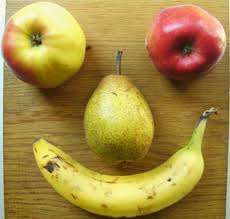
20 Mar Is Fruit Overrated?
There are countless generalizations about fruit, what’s your favorite one?
“Fruit can be eaten in unlimited quantities” So claims Weight Watchers.
“Fruit is natural sugar.” – Every consultation I’ve ever had.

Today we will breakdown the facts and fallacies of fruit and give you a plan for selecting the right fruit for your body type.
So what are the important things about fruit that you should know?
First, fruit is pure carbohydrates. Remember that carbs regulate insulin, which regulates fat cells. So when you eat fruit you will increase insulin and turn your body into carb burning/fat storage mode.
Insulin is like the over aggressive driver who cuts you off and leads to a 3 car pileup. It starts a hormonal wreck in your body.
If you are already lean and can handle carbs well then this driver just smoothly merges (you don’t store additional fat), but the more fat you have to lose, the more wreck less this driver causes. Eventually he’s like an alcoholic that drives for a living.
Second, most fruits are about 50% fructose (sweetener) and 50% glucose (sugar). By itself, glucose isn’t that sweet, but the fructose is. To understand the importance of this split, we need to understand the basics of carbohydrate utilization.
When you eat a carbohydrate one of 4 things happen:
1) It is immediately burned as energy
2) It is stored in the liver as energy
3) It is stored in your muscle as glycogen
4) It is stored as fat
Fructose is the only carb that CAN NOT be stored directly as glycogen in your muscles so it is much more likely to be stored as fat. Plus, it has to be processed in the liver, which over time can lead to non-alcoholic fatty liver disease.
In the words of Dr. Howenstine, M.D. “When ingested, fructose is immediately shuttled directly to the liver. In the liver it is a key building block in the manufacture of triglycerides. These triglycerides are then transported to the bloodstream carried by LDL (bad) cholesterol to the arteries where they can deposit in the artery walls. Animal research has shown that feeding a high fructose diet to animals is one of the fastest ways to raise triglyceride levels in the blood. The amount of fructose eaten by Americans is comparable in quantity to that fed to these animals. Diabetics commonly have elevated blood triglyceride values which clearly contribute to the development of arteriosclerosis.” (Link: How Healthy is Fructose)
Furthermore, fructose has been linked to many diseases such as obesity, diabetes, insulin resistance and is strongly linked to visceral fat accumulation, which is known to interfere with normal hormone levels. To put it plainly, this results in having a big belly and a short, unhealthy life.
Also, fructose is known to produce exogenous (external) Advanced Glycalation End Products (aka AGEs). Howenstine says that AGEs “accumulate in body tissues where they accelerate aging and thus contribute to the formation of cataracts, narrowing of arteries and kidney disease.”
At this point you should realize that not only is fruit not as healthy for you as you realized, it might be a root cause for some of the health issues we have today.
You would be right.
In my opinion, fructose isn’t the only bad guy, all sugar is. The 50/50 split is roughly the same for every sugar molecule.
It is the only molecule that makes you feel hungry (by increasing insulin), decreases the hormones that make you feel full (leptin and ghrelin), down regulates dopamine (which lowers your ability to say no) and creates a chemical reliance similar to that of heroin. (link: carbs are the new crack)
And while some slow burning carbs are better than others (ex: quinoa, sweet potatoes) all carbs breakdown to be the same thing: sugar. The same amount of insulin is released.
But I digress. Here is your take home message:
Avoid foods and drinks that are high glycemic and high in fructose: all high fructose containing foods and drinks. Examples include: any sugar, juices, high fructose corn syrup, cane juice, any syrup, all processed foods, the higher fructose containing fruits are bananas, honey, and agave (88% fructose).
Our bodies seem to only handle a small amount of fructose at a time. Functional medicine doctors recommend the average person does not exceed 5 g a day and active individuals not to exceed 20 a day. So that apple a day is about 10-12 g of your quota.
Stick to eating low fructose and glycemic foods if you’re seeking carbs.
For fruit, here are the lowest glycemic ones: berries, nectarines, avocados and tomatoes.
So while the phytonutrients in fruit are invaluable, the fat accumulation that comes with it is not. The best strategy is to get lean and eat in low glycemic carbs in moderation.
Remember that you should be eating 3-5 meals a day of meat and vegetables instead of just fruit. As delicious as it is, fruit is and always should be, merely a side dish.
A damn good side dish at that.
Stronger Everyday,
Marshall Ray – CSCS, CES, Biosignature
